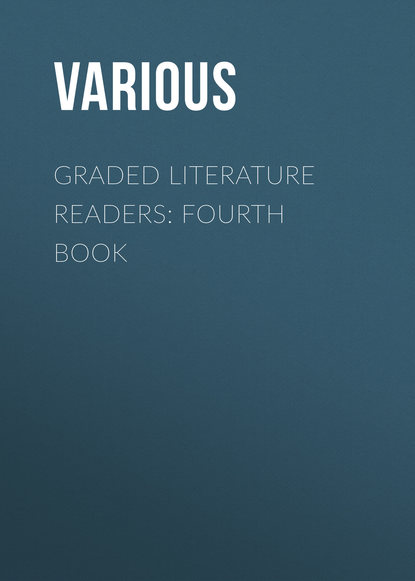 Полная версия
Полная версияПолная версия:
Graded Literature Readers: Fourth Book
ôr´bĭts: paths round the sun.
Ôr´pheus (fūs).
palanquin (păl aṉ kēn´): an inclosed carriage, used in China and India, which is borne on the shoulders of men by means of two poles.
păr´ȧ çhṳte: a sort of umbrella by means of which descent is made from a balloon.
păt´tĕns̝: wooden soles made to raise the feet above mud.
pēers̝: equals.
pĕlf: money; riches.
Pē´lĭ ăs.
pĕn´ē̍ trāte: pierce into.
Pĕ rï bä´no̤u.
pĕs´tĭ lençe: the plague; a deadly disease.
philosophy (fĭ lŏs´ō̍ fy̆): the science or knowledge of things, their causes and their effects.
phiz (fĭz): face.
pilot-cloth sack: a coat made of coarse dark blue cloth such as pilots wear.
plī´ant: bending easily without breaking.
plŭm´my̆: full of plums.
pŏl´lȯck: a sea-fish somewhat like the cod.
pŏl lū´tion (shŭn): uncleanness.
pôr´pȯis ĕs̝: sea animals.
pōrt: manner of carrying oneself.
pōr trāy´al: description.
pō´tion (shŭn): drink; dose, usually of liquid medicine.
prīed: looked closely.
prŏd´ûçe: that which is brought forth from the ground.
profession (prō̍ fĕsh´ŭn): employment; the business which one follows.
prō̍ mōt´ĕd: advanced; raised in rank.
prō̍ trūd´ĕd: thrust out.
prow: the forepart of a vessel.
prowl´ĭng: going stealthily or slyly.
quạd´rụ pĕd: an animal having four feet.
quāint: odd; curious.
quạr´ry̆: the animal hunted.
qua̤r´tẽr stạff: a long, stout staff used as a weapon.
quĕst: search.
răm´pärts: walls surrounding a place for its defense.
rē̍ lŭc´tant: unwilling.
rĕm ĭ nĭs´çĕnç ĕs̱ recollections.
rē̍ mŏn´stranç ĕs̝: objections.
rē̍ nounçe´: give up.
rē̍ pĕl´: drive away.
rē̍ prōach´fụl ly̆: chidingly.
rē̍ quīred´: needed.
rĕs̝´ĭn: a gummy substance which flows from the fir tree.
rē̍ splĕn´dent: very bright; shining.
rē̍ tīred´: went away.
rĕv ẽr ĕn´tial (shal): respectful; humble.
rōamed: wandered; went from place to place.
rō´s̝ē̍ ā̍te: rosy.
ro̤u tïne´: regular course of action.
rŭd´dĭ nĕss: redness.
săl´lĭed: ran out.
Säm ar känd´.
Sä mō´ä.
săn´dals̱: shoes consisting of soles strapped to the feet.
scĕp´tẽr: a staff carried by a king as a sign of his authority.
sēa-pīes̱: shore birds, sometimes called oyster catchers.
sē̍ clūd´ĕd: apart from others; lonely.
sĕdġ´ĕs̝: coarse grasses which grow in marshy places.
Sĕ rā´pĭs.
shēer: straight up and down.
shĭl´lĭngs̝: the shilling is a silver coin of Great Britain equal in value to about twenty-four cents of our money.
shōal: a great number, a crowd – said especially of fish.
smōl´dẽr ĭng: burning and smoking without flame.
sō´joûrn ẽrs̝: those who dwell for a time.
sō̍ lĭç´ĭt: ask earnestly.
sŏl´ĭ tā̍ ry̆: lonely.
sŏm´bẽr: dark; gloomy.
sōre´ly̆: greatly.
sȯv´ẽr eĭgn: effectual.
species (spē´shēz): kinds.
spīked: made the guns useless by stopping the vent or touchhole with a nail or spike.
sprāy: water falling in very small drops.
sprītes: spirits; fairies.
squa̤ws̝: Indian women.
strāight´wāy: at once.
strănd: shore.
strĭds̝: passages between steep rocks or banks so narrow that they look as if they might be crossed at a stride.
stûr´dy̆: strong.
sŭb´stĭ tū̍te: a person or thing put in place of another.
sŭlk´ĭ ly̆: peevishly; angrily.
sŭl´tan: an Eastern king.
sŭp´ple: easily bent.
sŭs pĕnd´ĕd: hung.
swēep: a boy who cleans chimneys by sweeping them.
swĩrl´ĭng: whirling.
sylph (sĭlf): a fairy.
sy̆m´pȧ thīze: pity.
Tăm´ȧ răck: the American larch.
Tȧ quȧ mē´na̤w: a river of northern Michigan, which flows into Lake Superior.
tẽrns̝: long-winged seabirds.
tĕt̶h̶´ẽred: fastened by a rope, for feeding within certain limits.
Thẽr mŏp´y (ē̍) laē.
t̶h̶ĭt̶h̶´ẽr: to this place.
tō´kens̝: signs.
tow'ẽr ĭng: very high.
trăṉ´quĭl: quiet, calm.
trăns pâr´ent: that can be seen through.
trăns pōrt´ĕd: carried.
tûr´bū̍ lent: disturbed; roused to great commotion.
ŭn ġĕn´tle: not gentle; rough.
ûr´chĭn: a little boy.
Vaī lï´ma.
văl´iant (yant): brave.
văl´or: courage.
väunt´ĭng ly̆: boastingly; braggingly.
vēered: turned; changed direction.
vẽr´dū̍r oŭs: green.
vī´brātes: moves to and fro.
vĭz´iers (yẽrs̝): in Eastern countries, officers of high rank.
Vŭl´can.
whĭst: still; quiet.
wĭg'wạms̝: Indian houses made of poles covered with mats or bark.
wĭnd´fa̤ll: portion of a forest blown down in a wind storm.
wrôught: worked.
Xerxes (Zẽrx´ēs̝).
yạcht: a light sea-going vessel used for parties of pleasure, racing, etc.
Phonic Chart
Vowelsā as in hāte
ā̍ as in senā̍te
ă as in hăt
ä as in fär
a̤ as in a̤ll
ȧ as in ȧsk
â as in câre
ē as in mē
ē̍ as in bē̍lieve
ĕ as in mĕt
ẽ as in hẽr
ī as in pīne
ī̍ as in ī̍dea
ĭ as in pĭn
ĩ as in sĩr
ō as in nōte
ō̍ as in viō̍let
ŏ as in nŏt
ū as in tūbe
ū̍ as in pictū̍re
ŭ as in tŭb
ụ as in pụll
û as in fûr
ṳ as in rṳde
oi, oy as in oil, toy
ou, ow as in out, now
o͞o as in mo͞on
o͝o as in fo͝ot
Equivalentsạ=ŏ as in whạt
e̱=ā as in the̱y
ê=â as in thêre
ï=ē as in polïce
ĩ=ẽ as in bĩrd
o̤=o͞o as in do̤
ọ=o͝o or ụ as in wọman
ô=a̤ as in hôrse
ȯ=ŭ as in sȯn
ȳ=ī as in flȳ
y̆=ĭ as in hy̆mn
Consonantsc as in call
ç as in çent
ch as in chase
c̶h as in c̶horus
çh as in çhaise
g as in get
ġ as in ġem
s as in same
s̝ as in has̝
th as in thin
t̶h as in t̶his
ṉ (=ng) as in iṉk
x (=ks) as in vex
x̝ (=gs) as in ex̝ist
1
From "Hunting Trips of a Ranchman," published by Messrs. G. P. Putnam's Sons.



